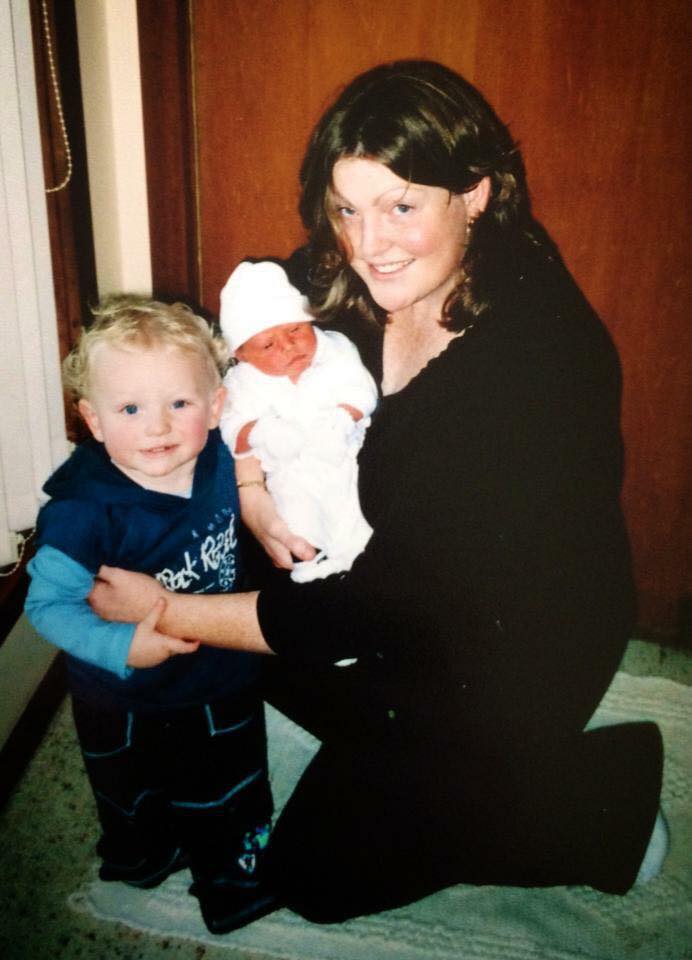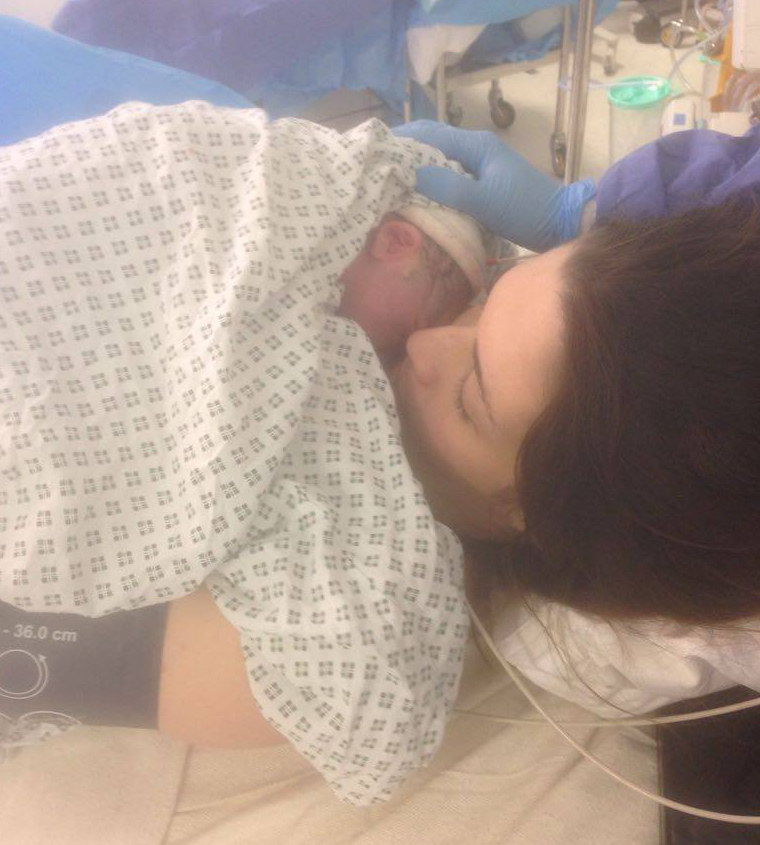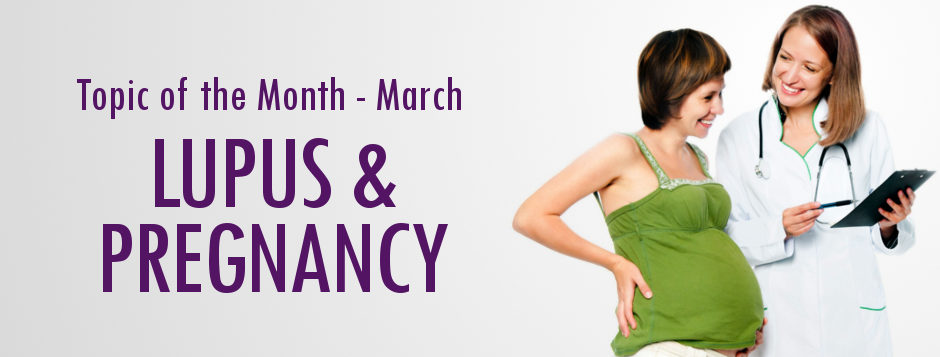
March’s Topic of the Month – Lupus and Pregnancy
 April 05th, 2018
April 05th, 2018 Nakita Cambow
Nakita Cambow Blog
Blog 0 Comments
0 Comments
In the past, women with SLE were discouraged from pregnancy due to concern regarding the effects of the disease on the mother and the baby. However, over the last 10-20 years, advancing technology, a better understanding of the disease and changes in medical practice mean that in many cases pregnancy is possible with close supervision, and advice will be tailored according to individual cases.
Planning a Pregnancy

Lea and baby Olivia
For the best chances of a successful pregnancy it is important to plan properly. It is advised to plan a pregnancy for when your lupus has been ‘inactive’ for a minimum of six months on stable therapy. Conceiving when lupus is active will increase the risk of disease flares during the pregnancy and increase the chance of complications for mother and baby.
It is strongly recommended that you meet with your doctor three to six months in advance of when you plan to try to become pregnant. This will allow them to screen for any risk factors such as kidney involvement, high blood pressure and any serious heart or lung problems. They will also be able to make any recommendations regarding changes to your treatment regimen.
“I would highly recommend using a pre-pregnancy planning clinic which is run by Obstetrics/Gynaecology and Rheumatology. I used it for my second, after a not-great experience with my first. The clinic is great; they put a plan in place from pre-conception to delivery. I was then on the high-risk clinic which involved scans and bloods every four weeks. Although you often have to go to a bigger (more specialist) hospital further away, make sure you still see a local midwife for routine checks too. I didn’t have a local midwife with my first which is what let me down as I was severely anaemic before birth.”
Drug therapy
An important part of planning pregnancy in lupus is to ensure that any medications you are taking are appropriate prior to conception and during pregnancy. You may be recommended to stop certain medications and you may be switched onto alternatives in some cases.
Some lupus treatments will need to be stopped and changed to an alternative (such as hydroxychloroquine and/or azathioprine) prior to conception. Drugs to be stopped before conception include;

Amanda with Declan and baby Wyatt
- Methotrexate (stop 3 months prior to conception)
- Cyclophosphamide (stop 3 months prior to conception)
- Mycophenolate mofetil (stop 3 months prior to conception)
- Rituximab (stop 1 year prior to conception)
- Belimumab (stop 1 year prior to conception)
- Leflunomide (stop 2 years before prior to conception)
- Bisphosphonates (stop 2 years prior to conception)
–
“I was swapped from mycophenolate back to azathioprine (and I have always been on hydroxychloroquine) and it was all fine. I have two healthy girls, born slightly early but no issues.”
Other medications that are contraindicated in pregnancy and therefore will be stopped or switched for alternatives include;
- ACE inhibitors (commonly used to treat heart failure and high blood pressure)
- Warfarin (a blood thinning treatment most commonly used to treat antiphospholipid syndrome, APS, in people with lupus)
–
Bumps (best use of medicines in pregnancy) have information on an exhaustive list of medicines in pregnancy HERE. They also have advice on what to do if you have already taken a medicine in pregnancy. It’s important to never stop taking a medicine that has been prescribed to keep you healthy without first checking with your doctor. Stopping your medicine could be harmful to both you and your baby.
Blood tests
Prior to conception it is important to be aware if the mother has certain antibodies, which may alter management during pregnancy, for example anti-Ro and anti-La antibodies. You can read more about these antibodies and the potential complications they may have in the next section; ‘During Pregnancy’.
It is important to know if you may have antiphospholipid syndrome (APS) or the associated antibodies, as this will increase the risk of blood clots (thrombosis) during pregnancy. In addition, the presence of these antibodies can increase the risk of pregnancy-related complications such as pre-eclampsia, IUGR, premature delivery or stillbirth. You can learn more about APS on the APS Support UK website, HERE.
“During my whole pregnancy I had to inject myself every day with fragmin to ensure I didn’t get any blood clots. I am a wimp with needles and hated the thought of the injections every day; however, I managed to inject myself and kept thinking the injections are to help my baby. My lupus treatment of azathioprine and hydroxychloroquine medication was kept the same throughout my pregnancy.”
Lifestyle and supplements

Kayleigh and daughter Saffron
As with all women planning a pregnancy, you can improve your chances of getting pregnant and having a healthy pregnancy by following these guidelines;
- Take a 0.4mg supplement of folic acid for three months prior to pregnancy and during the first 12 weeks of pregnancy to reduce the risk of neural tube defects.
- Stop smoking.
- Cut out alcohol.
- Calcium and vitamin D3 are encouraged before and during pregnancy.
- Keep a healthy weight (tips on diet and healthy eating in lupus can be found HERE and tips on exercising with lupus can be found HERE).
- Get any necessary vaccines – rubella (German measles) can harm your baby if you catch them in pregnancy. Most people in the UK are immune to rubella thanks to the uptake of the measles, mumps and rubella (MMR) vaccination. If you haven’t had two doses of the MMR vaccine or you’re not sure if you have, ask your GP practice to check your vaccination history. You should avoid getting pregnant for one month after having the MMR vaccination.
–
“We had a pre-conception planning meeting with my rheumatologist and a specialist team from Jessops Maternity Hospital when we told Rheumatology we wanted to try for a baby. At the meeting they advised me that I would have to stop my mycophenolate, duloxetine, naproxen and any codeine-based drugs. I was weaned off them one by one, each over a couple of months. Rheumatology wanted me to hit six months without a flare once off all those drugs and successfully onto azathioprine. At the meeting we were also told about the risks in a lupus pregnancy and what complications have been noted and how likely/unlikely they were. My immunity to German measles was checked and I was screened (again) to check for antiphospholipid syndrome. Once we hit the six months they introduced 75mg aspirin and folic acid and we were told to start trying as soon as we wanted. We lost our first pregnancy but our second was successful and surprisingly uncomplicated. What I would say to others considering having a baby is to stop the steroids; I wasn’t informed at the time of the risks involved as my rheumatologist felt the risk was ‘too low’ to go into much detail, but my son had to spend five days in hospital to be screened due to low functioning adrenal glands shortly after birth. All is fine now but it was awful, and I won’t have any more babies until I can drop that last 5mg!”
During Pregnancy
NHS Choices have an excellent checklist to help you stay organised through your pregnancy. You can print the list to keep track of things you need to do, such as book antenatal classes, tell your work you’re pregnant and think about where you’d like to have your baby. It also includes a number of helpful hyperlinks for additional information – Your Pregnancy To-Do List
Common health problems during pregnancy
Your body has a great deal to do during pregnancy. Sometimes the changes taking place can cause irritation or discomfort, and sometimes you may be concerned. You may experience a number of problems that are unrelated to your lupus and are rarely a need for alarm, but it is important to mention anything that is worrying you to your maternity team.
Some common health problems in pregnancy include;
- Constipation
- Cramp
- Feeling faint
- Feeling hot
- Incontinence
- Frequent urination
- Skin & hair changes
- Varicose veins
–
You can read more about these and other common health problems in pregnancy HERE.
Some common changes due to pregnancy can be mistaken for a lupus flare. All pregnant women can develop knee swelling (effusions) or carpal tunnel syndrome during pregnancy, but if there is a lupus flare your doctor should detect synovitis (inflammation of the joint lining). Pregnant women can develop redness (erythema) of palms and face, which is important to differentiate from a lupus rash.
Lupus flares during pregnancy

Lydia and baby James
The risk of flares during and after pregnancy due to hormonal changes is estimated to be approximately 50%, but most of these will be mild to moderate, affecting skin and joints predominantly rather than kidneys. The risk does vary according to patients’ background; a higher risk of flares is seen in women who have had a flare within six months prior to conception, previously very active disease, and if SLE therapy has been stopped.
It is important to promptly identify and treat flares during pregnancy as they can cause complications to both mother and baby. Complications include a possible increase in pre-eclampsia in mothers and a threefold increase in prematurity (birth before 37 weeks) and IUGR (poor growth of the baby) resulting in stillbirth.
It is important not to mistake active lupus nephritis (kidney disease) for pre-eclampsia. For doctors to diagnose lupus nephritis it is essential that the urine is examined for cells and/or casts. If cells are present, infection of the urine must be excluded. In patients with lupus nephritis proteinuria will normally rise before blood pressure whereas in pre-eclampsia the opposite is true. To assist with diagnosing a renal flare, there will often be other features of active disease in the patient and a change in the blood test results; rising anti-double stranded DNA antibodies and/or low complement. Pre-eclampsia will be more likely if associated with the features of HELLP syndrome (Haemolysis Elevated Liver enzymes Low Platelets).

Virginia and baby Delilah
If new symptoms are due to a lupus flare then it should be treated with steroids and immunosuppression, but if due to pre-eclampsia then steroids may make the blood pressure worse. The ultimate treatment for pre-eclampsia is delivery of the foetus, but anti-hypertensives (treatment for high blood pressure) may be used in the first instance.
One interesting phenomenon that can occur during pregnancy is that some women will actually have decreased lupus activity. This may be related to the fact that the foetus and placenta actually produce steroids such as cortisone and progesterone during pregnancy. These steroids can enter the mother’s bloodstream and help to decrease lupus activity, especially during the second and third trimesters.
“My blood counts and lupus were the best they had been during my pregnancy and I felt the healthiest I had been; no joint pain.”
Thrombosis (blood clots)
All pregnant women are at risk of thrombosis, but especially those with lupus and/or antiphospholipid antibodies. Patients with confirmed antiphospholipid syndrome are likely to require treatment with both aspirin and subcutaneous heparin throughout pregnancy. Patients with recurrent miscarriages in the first trimester may be treated with aspirin. Aspirin may also be commonly used in women with SLE who do not have antiphospholipid antibodies to prevent thrombosis and pre-eclampsia.
Effects of lupus on the baby
Intrauterine growth restriction (IUGR): This refers to poor growth of a baby while in the mother’s womb during pregnancy. The risk of IUGR is increased in women with lupus when compared to the general population, especially in those who have antiphospholipid antibodies, active lupus at conception and high blood pressure during pregnancy. IUGR increases the risk of premature delivery.

Dalila with baby Benjamin
Premature delivery: This is more common in women with lupus and is defined as delivery before 37 weeks. It occurs in 40-50% of SLE pregnancies. The risk of premature delivery increases if the mother has active lupus, kidney involvement, hypertension, pre-eclampsia and high dose steroids (20mg or more of prednisolone). The delivery may be spontaneous or more often induced, due to concerns regarding foetal growth (IUGR), reduced liquor (amniotic fluid around the foetus), foetal distress or rupture of membranes. Once the baby is mature enough to be delivered and survive in a neonatal ward, it is often advised to have an induced birth or caesarean to deliver the baby before it dies in utero, if there are concerns. There are numerous consequences of premature delivery for the foetus. The most serious are breathing problems; mothers will normally be given a course of special corticosteroids (eg. dexamethasone, which can cross the placenta), to promote foetal lung development. Other possible complications include infection, liver problems (jaundice), feeding difficulties, developmental delays or neonatal death (within 4 weeks of birth).
“Both of my sons were born with neonatal lupus. One nearly died. I had many complications throughout each pregnancy, particularly with oligohydramnios (low fluid), which is common in lupus. My second son was born at 37wks due to oligohydramnios. The only fluid he had in the womb was one tiny 2cm pocket under his chin. When he came out the cord was wrapped around his neck twice and he never cried. He was blue and put on oxygen and sent to intensive care. There they told me to say goodbye, as his platelets were dangerously low. After 2 weeks in intensive care he got to go home. He is now almost 12 years old.”
Foetal loss: Foetal loss includes spontaneous abortion before 10 weeks, miscarriages between 10 to 19 weeks and still births from 20 weeks onwards. There is an increased rate of foetal loss and miscarriages in lupus patients. The risk is higher in those with a previous history of foetal loss (especially before 10 weeks), antiphospholipid syndrome, active lupus before or during pregnancy, kidney disease and pre-eclampsia.
Congenital heart block: In approximately 1% of cases anti-Ro and anti-La antibodies can cross the placenta and cause congenital heart block. If these antibodies are present they can only cross the placenta after about 16 weeks and therefore weekly foetal heart monitoring will be undertaken by a midwife/doctor from this point. A few babies will die in utero due to a congenital heart block and the related cardiac complications. The majority who are born do well. However, approximately 30% will require a pacemaker during the first month of life, 30% in the first year, and the remainder will require a pacemaker by the age of 10 to 12 years.
“I was under very close supervision from 16 weeks – weekly heart monitoring for baby, and then 4 weekly for me, due to having anti-Ro/La antibodies in addition to my lupus. It was a tough pregnancy and has continued to be difficult. My baby is now 9 months old. I was closely supported by my obstetrician and rheumatology throughout at a large hospital and this really helped. It was difficult, but I have no regrets; it is the best thing ever being a mummy!!”
Delivery

Rachael with Oliver and Leila
In people with SLE a vaginal delivery should be possible, with pregnancy planning and joint care. A caesarean is normally reserved for emergencies, women who have previously had a caesarean and do not want the trial of vaginal delivery, and women with severe hip disease. However, to reduce the risk of still birth in women with active lupus and/or antiphospholipid syndrome, induction is usually planned at 38-39 weeks.
“I have SLE, antiphospholipid syndrome and lupus nephritis. I thought I couldn’t have a baby but thanks to the LIPS (lupus in pregnancy service) clinic at St Mary’s in Manchester I had my baby in October 2017 by emergency section weighing 4lbs 6oz at 34 weeks. I was monitored every few weeks. It was tough but he’s absolutely fine.”
After Delivery
“I have suffered with SLE since I was 16. I gave birth to a healthy baby boy at 30 years old in 2007 with no complications and my pregnancy went well. I was very blessed despite being a lupus patient. My lupus remained in remission until he was 7 and then I encountered a bad flare where I was hospitalised a few times, but that was 3 years ago and now I am in remission again.”
Breast feeding
Breast feeding has multiple benefits and can reduce the risk of certain health complication for the baby such as;
-Infection
– Atopic dermatitis (eczema)
– Asthma
– Obesity
– Type 1 and 2 diabetes
– Childhood leukaemia
– Sudden infant death syndrome
It can also reduce the risk of health complications for the mother, including;
– Type 2 diabetes
– Breast cancer
– Ovarian cancer
– Postnatal depression
It is safe to breastfeed whilst taking prednisolone, hydroxychloroquine and heparin or warfarin. It is also increasingly accepted that it is safe to breastfeed whilst taking azathioprine as there are only low levels of the active form of the drug in breast milk. For information about the safety of more drugs for breastfeeding, CLICK HERE.
You can get lots of great information and advice about breastfeeding from The Breastfeeding Network.
Lupus flares
There is a risk of flares in the postpartum period, even if the disease has been stable before and during pregnancy. It is important to seek medical attention if you experience symptoms of a lupus flare, so your drugs can be appropriately managed.
Blood clots
All women will have an increased risk of blood clots after pregnancy; this risk is further increased in women with lupus (with or without antiphospholipid antibodies). It is essential to keep as active as possible and remain on any recommended blood thinning medication (heparin or warfarin). If you experience any symptoms of a blood clot such as a painful swollen calf or breathlessness with chest pain, you must seek urgent medical attention.
Advice from mums with lupus

Kayleigh with Noah and Effie
“If help is offered to you – take it!”
“Don’t feel you need to be perfect and do everything. Rest and enjoy sitting having cuddles doing nothing. If people offer help, take it. It’s exhausting anyway but much harder with lupus.”
“My advice is don’t get so caught up in taking care of your little one that you ignore signs your body is giving you that something isn’t right. Speak to your doctor straight away. When you are at your best then your care for your child is also at its best! Ask for help from the ones around you and rest as much as you can. It helps to explain to your loved ones how your lupus affects you; giving them understanding of your symptoms can really help.”
“My little one is now 18 months old and full of energy, here are little tips I have learnt along the way. These are things that have helped/worked for me:
1) Try to set up a baby changing area/station both upstairs and downstairs. Make sure it is at a height that is comfortable for you and safe for a baby/wriggling toddler!
2) You can buy car seats that come on a 360 degree ISOFIX base. I have the Joie Spin 360 and it’s amazing; I can turn the seat to face the car door to get my son in and out the car and then turn it so it’s rearward facing. It puts less stress on backs/joints.
3) Car seats/baby carriers are heavy enough without babies in. There is a knack to carrying them more comfortably (take a look at this video).
4) Try and do online food shopping. Food shopping is the last thing on your mind when you are sleep deprived and have a cute little one to cuddle.
5) The saying, “rest when the baby is resting” is near enough impossible until they are a bit older and you make the most of their naps. I have learnt that this means make the most of help offered and don’t be afraid to tell people what would help!
6) If you are going to be inundated with visitors, just put mugs, tea and coffee etc. on the side – let them help and wash their mugs themselves and thank them for being so helpful!
7) Be aware of your triggers for flares and share these with family and close friends. Sometimes you are so wrapped up in your little one that you forget about yourself, but they can notice first.
8) Don’t forget to book your check-up with your GP or rheumatologist if your medication was stopped or changed, as you may need to have this reviewed. Your hormones are going to go crazy and if you’re like me, this can cause a flare.
9) Enjoy your baby, be aware of your body and be open with family.
10) Don’t feel you have to go to every baby club, toddler group and activity in your local area! Find the ones that suit you, your fatigue levels (e.g. are you feeling less achy/fatigued in morning or afternoon) and the baby’s routine!
Finally, congratulations! Being a parent is so much fun (sleep deprivation and tantrums aside)! Lupus is part of our lives but you have a huge distraction that will put a big smile on your face every day.”
“I’ve written a few blog posts on my experiences when I had my daughter two years ago. I hope they’re useful; ‘Great Expectations’, ‘The Greatest Act’.”
Will my child develop lupus?
Neonatal lupus syndrome
In mothers who are positive for anti-Ro and/or anti-La antibodies the baby may develop neonatal lupus syndrome. This syndrome may present as a transient rash, heart block (as described previously), liver abnormalities or low platelets.
The rash is rarely evident at the time of birth; in most babies it requires exposure to ultraviolet light before it occurs. This may occur soon after birth or weeks or months later (on average first becoming apparent six weeks after birth). The rash causes circular-shaped red areas, especially on the face (particularly around the eyes) and scalp. The most important part of treatment is protecting the baby from light and using sunscreen. The rash usually does not scar the skin significantly, but it may leave mild discolouration.
The anti-Ro and anti-La antibodies disappear from the baby’s system within six to eight months. Having neonatal lupus syndrome does not appear to increase a child’s risk of developing SLE later in life.
SLE
There are many genes involved in the development of lupus (only half of which are likely to be inherited from one parent with lupus), and because environmental triggers have to occur during the life of the individual to make the disease appear, it is not common for the children of people with lupus to also have the disease. Most studies have shown that about 1 in 20 people with lupus will have a close relative (mother, aunt, sister, brother; less often father or uncle) with lupus.
Further Reading
LUPUS: A Guide to Pregnancy
Further information about pregnancy in lupus can be found in our booklet, ‘LUPUS: A Guide to Pregnancy’. You can read and download the booklet HERE. If you require a physical copy, contact us to request one, free of charge.
NHS Choices – Your Pregnancy and Baby Guide
Keeping well in pregnancy
Healthy pregnancy diet
Baby Centre
Information covering everything through conception, pregnancy and baby health.
Tommy’s
Tommy’s fund research into miscarriage, stillbirth and premature birth, and provide pregnancy health information to parents.
Premature Babies
The information on this website is for intended parents, friends and families who have given birth to a premature baby and in need of knowledge to support their loved ones.
***Please note that this article is written for informational purposes only and should not be a substitute for professional medical advice or treatment. Do not delay seeking or disregard medical advice based on information here. Always seek the advice of your local family physician or other qualified health professional before starting any new treatment or making any changes to existing treatment. It is also advisable to consult a medical professional before making any changes to diet or starting complementary remedies, which may interact with other medications.***
Thank you so much to everyone who submitted their tips and experiences for this month’s topic. We’re sorry if we weren’t able to use your comment in the article this time.



 ©2024 LUPUS UK (Registered charity no. 1200671)
©2024 LUPUS UK (Registered charity no. 1200671)